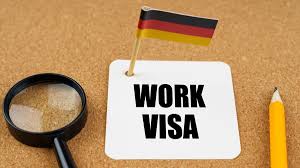The dream of living and working in Germany long term is one that many immigrants across the world share. Germany’s economy is strong, its cities are safe, and the opportunities for skilled workers, entrepreneurs, and families are endless.
If you’re already living in Germany or planning to move soon, getting the Germany Permanent Residency Visa for Immigrants might be one of the smartest decisions you can make. It gives you the legal right to live, work, and enjoy life in Germany indefinitely without worrying about renewals or visa restrictions. In this guide, we’ll explore what permanent residency in Germany means, who qualifies for it, the Germany Permanent Residency Visa Requirements, how to apply, the benefits, and insider tips to make your application successful.
Understanding the Germany Permanent Residency Visa for Immigrants
The Germany Permanent Residency Visa, also known as the settlement permit (Niederlassungserlaubnis), allows non-EU citizens to live and work in Germany without any time limit. While temporary residence permits are issued for specific periods (like one or two years), the settlement permit offers stability, security, and freedom. There’s also another version called the EU Blue Card Permanent Residence Germany, which gives you the additional option of moving to other EU countries under certain conditions. Both options grant you almost all the rights that German citizens enjoy, except for voting or getting a German passport.
Benefits of Germany PR Visa
Why do so many people aim for permanent residency? The benefits go beyond legal status. Here’s what you gain when you secure your Germany Permanent Residency Visa for Immigrants.
-
Unlimited stay and work rights: You can live and work anywhere in Germany, for any employer, or even run your own business without needing a new visa.
-
Job flexibility: You can switch jobs, industries, or even become self-employed without immigration restrictions.
-
Social benefits: Once you have the Germany PR Visa, you’re eligible for public health insurance, pension, child benefits, and unemployment insurance.
-
Education and opportunities: You and your children get full access to Germany’s education system, vocational training, and scholarships.
-
Family reunification: It’s easier to bring your spouse or children to live with you permanently.
-
Stability and travel freedom: You no longer have to renew permits every few years, and travel across the EU becomes smoother.
Germany Permanent Residency Visa Requirements
The requirements for permanent residency are clearly outlined in Germany’s immigration laws, but they can differ slightly depending on your category. In general, to qualify for the Germany Permanent Residency Visa Requirements, you must meet the following conditions:
-
You must have lived legally in Germany for at least five years with a valid residence permit.
-
You should have paid contributions into the German pension system for at least 60 months (five years).
-
You need to demonstrate that you can support yourself and your family financially without relying on government benefits.
-
You must have adequate health insurance coverage.
-
You need proof of German language proficiency (usually B1 level) and basic knowledge of German laws and society.
-
You must have suitable housing or accommodation for yourself and your family.
-
You should have a clean criminal record.
For those wondering how long it takes, the usual period is five years, but in many cases it can be faster, especially for skilled professionals and German PR for Skilled Workers who hold an EU Blue Card Permanent Residence Germany.
Fast-Track Options for Skilled Workers and Professionals
If you’re working in Germany under a qualified position, you may be eligible for permanent residency faster than the standard five years. Skilled workers, researchers, and graduates from German universities can often apply after two to three years. If you hold the EU Blue Card, you can qualify for permanent residency after 33 months of employment in Germany — or even 21 months if you have strong German language skills (B1 or above). These are major advantages for those pursuing the Germany Permanent Residency Visa for Immigrants through professional work routes.
How to Apply for German PR Visa
Applying for the Germany Permanent Residency Visa for Immigrants involves several steps, and being prepared will make the process smooth. Here’s a clear breakdown of how to apply for German PR Visa:
-
Check your eligibility: Before starting, ensure you meet the residency, employment, and language requirements.
-
Gather documents: You’ll need your passport, proof of income, employment contract, health insurance, pension statements, language certificates, rental agreement, and proof of residence registration.
-
Book an appointment at your local immigration office (Ausländerbehörde). Most cities require scheduling online or by phone.
-
Fill out the application form and pay the processing fee (usually between €113 and €147).
-
Attend your interview: The immigration officer may ask questions about your work, language, and integration.
-
Wait for approval: Processing time can range from a few weeks to a few months depending on your location.
It’s important to ensure every document is up-to-date, translated into German if needed, and properly certified. Many people lose valuable time due to missing documents or incomplete forms.
Tips for a Successful Application
The Germany Permanent Residency Visa for Immigrants process can seem intimidating, but with proper preparation, it’s achievable.
-
Keep all payslips and proof of tax or pension contributions from your first year of employment.
-
Take your German language course seriously — aim for at least level B1.
-
Attend integration courses offered by the government; they strengthen your profile.
-
Maintain continuous residence in Germany; don’t spend long periods abroad.
-
Avoid relying on social assistance, as it can affect your eligibility.
-
Keep your passport and residence permit valid throughout the process.
Costs and Processing Times
The Germany Permanent Residency Visa Requirements come with modest application fees. For most applicants, the cost is €113; for self-employed individuals, it’s around €124, and for highly qualified professionals, about €147. Additional costs may include document translations, language classes, and certification fees. Processing times vary depending on your city, but on average, expect it to take between six weeks to three months.
Germany Permanent Residency Visa for Immigrants vs. German Citizenship
Permanent residency and citizenship often get mixed up, but they’re different. With permanent residency, you can live and work indefinitely in Germany, but you’re still considered a citizen of your home country. Citizenship, however, gives you a German passport and voting rights. Usually, immigrants hold permanent residence for several years (often six to eight) before applying for naturalization. Think of the Germany Permanent Residency Visa for Immigrants as a major step toward full integration — a foundation before citizenship.
Losing Your Germany PR Visa
Although the Germany PR Visa is permanent, it can be lost under certain conditions. If you leave Germany for more than six consecutive months without approval, your residency status might expire. Similarly, serious criminal convictions, or giving up your registered address in Germany, can lead to revocation. Always keep your registration (Anmeldung) active and follow German residence rules.
Germany Permanent Residency Visa for Immigrants: Financial and Career Opportunities
Holding a Germany Permanent Residency Visa opens major opportunities. You can apply for better jobs, access housing loans, or even start your own company. Employers value permanent residents because it shows commitment to the country and eliminates the need for visa sponsorship. Additionally, with permanent residency, you can access government programs, tax benefits, and education grants. It’s especially valuable for German PR for Skilled Workers who plan long-term careers in Germany’s high-demand industries like engineering, healthcare, and information technology.
Common Mistakes to Avoid When Applying for Germany Permanent Residency Visa
Many applicants fail or delay their approval because of preventable mistakes. Avoid these:
-
Applying before you meet the minimum residence period.
-
Submitting incomplete financial records or missing pension statements.
-
Not providing a recognized German language certificate.
-
Failing to register your residence correctly when moving cities.
-
Taking long breaks outside Germany during your residence period.
Recent Policy Updates on Germany Immigration Law PR Visa
Germany has introduced new immigration reforms to attract global talent. The latest updates under the Germany Immigration Law PR Visa make it easier for skilled workers, researchers, and Blue Card holders to transition to permanent residency. The aim is to simplify the process, reduce bureaucracy, and encourage long-term settlement of qualified immigrants. These changes also shorten the timeline for those who have studied or completed vocational training in Germany.
Financial Planning for Immigrants Seeking Germany PR Visa
When working toward your Germany Permanent Residency Visa Requirements, financial preparation is key. You need to demonstrate consistent income and the ability to sustain yourself. Keeping clean tax records, saving for emergencies, and ensuring steady employment all improve your eligibility. Employers often provide documentation proving your contributions to the pension scheme — save these carefully, as they’ll be required during application.
Life After Getting the Germany Permanent Residency Visa
Once you receive your Germany Permanent Residency Visa for Immigrants, you gain true freedom. You can move between states without new permits, apply for home loans, and even start your own company. Families benefit greatly — spouses and children can apply for similar status, enjoy education and healthcare, and access all public services. Many immigrants describe getting their settlement permit as life-changing because it finally gives them security after years of temporary permits.
The Future of Germany Permanent Residency for Immigrants
As Germany continues to face labor shortages in skilled sectors, it is likely that future reforms will make the Germany Permanent Residency Visa for Immigrants even more accessible. Programs targeting IT professionals, healthcare workers, and technical experts are expanding. This trend positions Germany as one of the most immigrant-friendly countries in Europe, especially for those who meet the Germany Permanent Residency Visa Requirements and want to build long-term lives there.
Final Thoughts
Applying for the Germany Permanent Residency Visa for Immigrants can seem complex, but with patience and preparation, it’s completely achievable. Whether you’re a student graduate, a professional on an EU Blue Card, or a self-employed entrepreneur, permanent residency is your gateway to freedom, stability, and prosperity in Germany. Meeting the Germany Permanent Residency Visa Requirements, understanding how to apply for German PR Visa, and planning ahead financially will help you secure your future. Once you get your PR, you’ll enjoy nearly all the benefits German citizens have — from career flexibility to family security. For anyone dreaming of settling down in one of the world’s strongest economies, the Germany Permanent Residency Visa for Immigrants is truly the key to unlocking that future.



